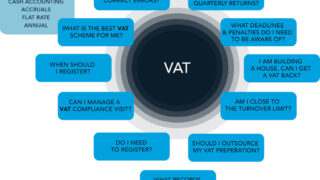Corporate Income Tax (CIT) is one of the most important taxes that directly impacts every business activity of an enterprise. Not merely a financial obligation, CIT also holds strategic significance in maintaining economic stability and supporting business development. In this article, we will help you gain a clear understanding of corporate income tax, from its basic definition to its roles and related legal regulations, enabling you to optimize benefits while ensuring compliance with the law.
What is Corporate Income Tax (CIT)?
Definition of CIT and Its Importance
CIT (Corporate Income Tax) is a direct tax applied to the taxable income of business entities. This tax plays a crucial role in building the state budget, maintaining societal functions, and ensuring sustainable development. Beyond its legal obligations, CIT serves as a tool to help businesses enhance their credibility and promote healthy business practices. Understanding CIT enables businesses to comply with regulations, avoid violations, and seize opportunities from tax incentive policies.
Legal Significance of Corporate Income Tax
Corporate Income Tax is regulated by law to ensure fairness in budget contributions among enterprises. Timely CIT payments not only help businesses avoid legal risks but also establish a professional image in the eyes of partners and customers. Legal documents related to CIT are frequently updated to align with economic conditions, so businesses must closely monitor these changes to remain compliant. Any violations related to CIT can result in heavy fines or tax recovery.
Basic Terms Related to CIT
- Tax Base: The total taxable income of a business after deducting legally permitted exemptions.
- Taxable Income: Includes profits from core business activities, financial investments, or other revenues earned by the enterprise.
- Tax Deductions: Reductions allowed to lower the amount of tax payable.
Understanding these terms will help businesses fulfill their tax obligations accurately and comprehensively.
Illustrative Example of CIT Calculation
Assume Company B has a total annual revenue of 10 billion VND. After deducting legitimate expenses of 7 billion VND, the taxable income amounts to 3 billion VND. With a tax rate of 20%, the company would have to pay 600 million VND in CIT. Clear calculations like this help businesses avoid errors and ensure transparency in reports submitted to tax authorities.
The Role of Corporate Income Tax in the Economy
Contributing to Economic Stability
CIT plays a crucial role in maintaining the stability of a nation’s economy. This source of revenue allows governments to implement sound fiscal policies to regulate markets, reduce inflation, and support key economic sectors. Notably, CIT also enhances investor confidence, both domestic and international, providing a solid foundation for sustainable development.
Providing Resources for Infrastructure Development
Revenue from CIT is often allocated to public projects such as transportation, healthcare, education, and energy. This not only improves the quality of life for citizens but also creates a favorable business environment. Strong infrastructure helps businesses reduce operating costs, boost economic efficiency, and attract foreign investment to the country.
Supporting Social Income Redistribution
CIT serves as an essential tool for addressing income disparities among business groups, contributing to fairness in the business environment. Larger corporations typically bear higher tax rates, while small enterprises or startups may receive tax incentives. This encourages balanced development across various economic sectors.
Promoting Investment and Business Development
Through tax exemptions or deductions associated with CIT, many businesses gain the motivation to invest in research, product development, and expansion. Governments often use CIT incentives as a strategic tool to stimulate growth in priority sectors, fostering healthy competition in the market.
Steps to Prepare Financial Statements in Compliance with Regulations
The Importance of Financial Statements in CIT
Financial statements are the primary tool for determining the tax base for corporate income tax (CIT). These are not only legal documents but also provide a comprehensive overview of a company’s financial health and business performance. Complete and accurate financial statements ensure transparency, facilitate access to tax incentives, and help businesses avoid violations related to tax obligations.
The Basic Structure of a Financial Statement
Financial Statements Consist of Key Components:
- Balance Sheet: Provides information about assets, liabilities, and equity.
- Income Statement: Details revenue, expenses, and profits during the period.
- Cash Flow Statement: Tracks cash inflows and outflows, supporting effective cash management.
- Notes to Financial Statements: Explains figures and accounting policies applied.
Each part plays a crucial role in financial control and strategic planning for the business.
Process of Preparing Financial Statements in Compliance with Current Laws
- Collect Financial Data: Gather all invoices, documents, and figures related to business activities.
- Classify and Record Transactions: Properly categorize income and expenses according to accounting standards.
- Reconcile and Verify: Ensure data accuracy before drafting the report.
- Prepare Official Reports: Use templates specified by the tax authority and submit within the deadline.
Following this process helps businesses avoid errors and save time and costs when dealing with tax authorities.
Common Issues and Mistakes in Financial Reporting
Businesses often encounter errors such as failing to update legitimate expenses, omitting revenue, or using incorrect report templates. These mistakes can result in fines or report adjustments, affecting credibility. To mitigate these risks, businesses should use modern accounting software or hire experienced professionals for support.
Learn more: FINANCIAL STATEMENTS
Recent Legal Changes in Corporate Income Tax (CIT)
Additional Regulations and New Tax Rates
Currently, the standard CIT rate is 20%, applicable to most businesses. However, certain priority sectors such as high technology, agriculture, or education may benefit from preferential rates of 10-15%. This regulation encourages investment in critical industries and enhances business competitiveness.
Guidelines on Tax Exemptions and Legal Deductions
Businesses can qualify for tax exemptions or reductions if they meet specific conditions, such as:
- Investing in economically disadvantaged areas.
- Engaging in research and development activities.
Additionally, expenses such as marketing, employee training, and charitable contributions can be legally deducted, reducing the tax burden.
Penalties for CIT Violations
Businesses that misreport, underpay, or evade taxes are subject to administrative penalties or tax recovery with high interest rates. Current penalties range from 20-50% of the misreported tax amount. Strict compliance with regulations is essential to avoid legal consequences.
Impact of Legal Changes on Businesses
The continuous evolution of CIT regulations requires businesses to stay updated to ensure compliance. Failure to keep up can result in increased compliance costs or even regulatory violations. Collaborating with professional consulting firms is a smart choice to minimize risks.
Corporate Income Tax (CIT) is not only a financial obligation but also a key to sustainable business development and contributing to economic stability. Understanding its role, the process of preparing financial statements, and keeping updated on legal changes will help businesses optimize benefits and avoid unnecessary risks. Let Wacontre’s experts assist you in managing taxes and finances efficiently, ensuring compliance with the law and enhancing business performance.
Learn more:
WHAT IS VAT? ESSENTIAL INFORMATION ACCOUNTANTS SHOULD KNOW ABOUT VALUE ADDED TAX (VAT)
For any inquiries, contact Wacontre Accounting Services via Hotline: (028) 3820 1213 or email info@wacontre.com for prompt assistance. With a team of experienced professionals, Wacontre is committed to providing dedicated and efficient service. (For Japanese clients, please contact Hotline: (050) 5534 5505).








